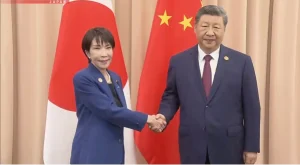A press conference was held in the Japanese Parliament to address the issue of Uyghur forced labor. Japanese companies linked to such practices were urged to sever ties, and authorities were called on to enact binding legislation.
On May 16, 2025, the Japan Uyghur Association and the international human rights organization Human Rights Now (HRN) held a joint press conference in the Japanese Parliament. They publicly named Japanese companies allegedly linked to China’s use of forced labor involving Uyghurs, calling on those companies to end such ties and urging the government to enact legally binding measures against forced labor.
Over 80% of Investigated Companies Found Linked
According to the two organizations, the investigation targeted 35 Japanese companies and 6 China-based companies operating in Japan, based on the 2020 report by the Australian Strategic Policy Institute (ASPI) and additional updated data. The research was supported by the U.S.-based think tank C4ADS.
The findings revealed that over 80% of the 41 companies investigated were connected to forced labor involving Uyghurs. Thirty Japanese firms and four Chinese companies—active in sectors such as apparel, automotive, and electronics—were found to have direct or indirect business ties with suppliers allegedly involved in forced labor in East Turkistan (XUAR in China). While around half of the companies failed to respond to inquiries, several acknowledged past ties and claimed they had since terminated those relationships.

“Forced Labor Is a Modern Form of Slavery”
Speaking at the press conference, HRN Deputy Director Kazuko Itō stated, “Forced labor is a modern form of slavery. Japanese companies must sever their ties with these human rights abuses,” stressing the need for greater transparency and corporate responsibility.
Letip Ahmet, President of the Japan Uyghur Association, warned that Japan risks becoming a “loophole” for Chinese companies avoiding sanctions imposed by Western countries. “Japan’s human rights values must not be compromised,” he added.
Calls for Binding Laws in Japan
Liberal Democratic Party (LDP) lawmakers who attended the conference emphasized the need for stronger legal frameworks. Former Minister for Economic Security Sanae Takaichi commented, “This is a human rights issue. Japan should adopt binding laws similar to those in the U.S.” Keiji Furuya, Chair of the Japan Uyghur Parliamentary League, added, “As parliamentarians of a democratic nation, we must take a firm stance,” pledging to raise the issue in the Diet.
U.S. and EU Have Introduced Legislation
In April 2022, the United States enacted the Uyghur Forced Labor Prevention Act, effectively banning the import of goods linked to forced labor in Xinjiang. The European Parliament also reached a provisional agreement in March 2024 to prohibit the import and circulation of products made using forced labor.
Although the Japanese government issued non-binding guidelines on human rights due diligence for companies in April 2022, there is still no legal enforcement mechanism. Compliance remains voluntary, and there are no penalties for violations.






Be First to Comment